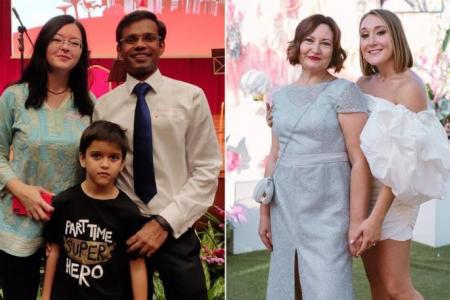Ukrainians and Russians living in Singapore hope for peaceful resolution of Ukraine crisis
As Russian troops moved into eastern Ukraine on Monday (Feb 21), after Russian President Vladimir Putin recognised two breakaway regions as independent, the Ukrainian community in Singapore began to fear the worst.
In her Bukit Batok home, Ms Galyna Kogut, who has lived here for more than 15 years, felt a deep sense of unease.
The Singapore citizen, whose parents, brothers and cousins are living in the Ukrainian capital Kyiv, said the Russian incursion into the eastern regions of Donetsk and Luhansk - described by Moscow as a peacekeeping operation - was meant to send a message that "we are here".
The United States has said the move was part of Moscow's attempt to create a pretext for a further invasion of Ukraine.
Ms Kogut, a research fellow at the National Institute of Education studying bilingualism, told The Straits Times in a phone interview on Wednesday: "That is threatening to the whole country and people are very much concerned, and there is an uneasy feeling among those of us who have family members there."
Since Russia's annexation of Crimea in 2014, tensions between separatists and the Ukraine armed forces have made Ukrainians living abroad worry for their families in their homeland, and the latest developments have made the danger feel more imminent, said Ms Kogut.
In the last two days, she has kept in touch with her family in Ukraine through messages and voice notes. They told her that Ukrainians are hoping sanctions on Russia by countries such as the US, Britain and Japan would help ease the Russian threat.
They also shared their belief that Ukraine can put up a strong resistance, should the threat become worse, she added.
Ms Kogut, who is president of the Ukrainian Club in Singapore, said: "Those from Donetsk and Luhansk are worried for their relatives, especially if they are older and cannot move to safer areas in Ukraine.
"It is hard to for us living abroad as we don't know exactly what is happening over there."
The local community of about 450 Ukrainians keeps in touch regularly via social media and WhatsApp, sharing information so that everyone can keep tabs on the latest developments.
Ms Daria Samokish, who has been in Singapore for two years, said she was surprised by how quickly events unfolded on Monday.
The 27-year-old, who is head of public relations at software company Ahrefs, said she is worried for her 50-year-old mother and 72-year-old grandmother who live in the industrial city of Kryvyi Rig.
"We chat every few hours to support each other. I'm worried for my family, but I must say how bravely they are coping with the news and the threat of a big war," she said.
"Of course, they are worried and scared... But I was so proud to hear from my mother and grandmother, who told me: 'We won't escape. This is our home. We will stay and help with what we can do'."
Ahrefs founder Dmitry Gerasimenko, a 37-year-old Ukrainian based in Singapore, said recent events have made him anxious.
"I am in contact with my parents every day. They are not close to the region where the invasion is currently happening, but they are still close to the border with Russia," he said.
"They are worried about the situation, but they are also ready to help protect the country as much as they can."
Meanwhile, the Russian Club in Singapore, which serves the Russian community here, told ST that people from the country who live here are very worried about the developing situation.
Its spokesman said: "What started as the 'usual' war of words a month or two ago has quickly escalated into unsettling scenarios.
"We all have Ukrainian friends and relatives, colleagues and business partners. We feel and share the same stress, pain and concerns. We do hope for the urgent peaceful resolution and de-escalation of the conflict. The lives and security of the people are sacred and of utmost importance."
Get The New Paper on your phone with the free TNP app. Download from the Apple App Store or Google Play Store now


